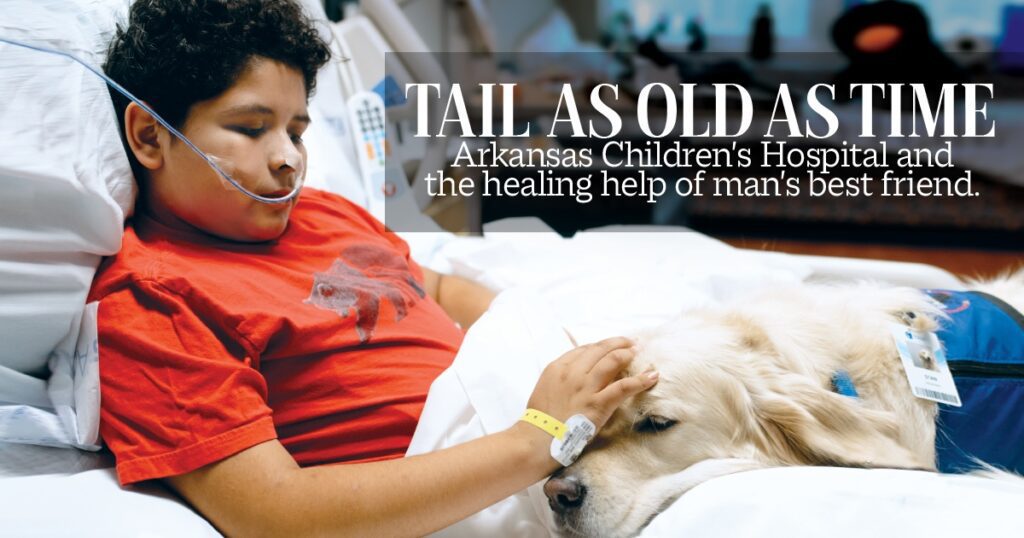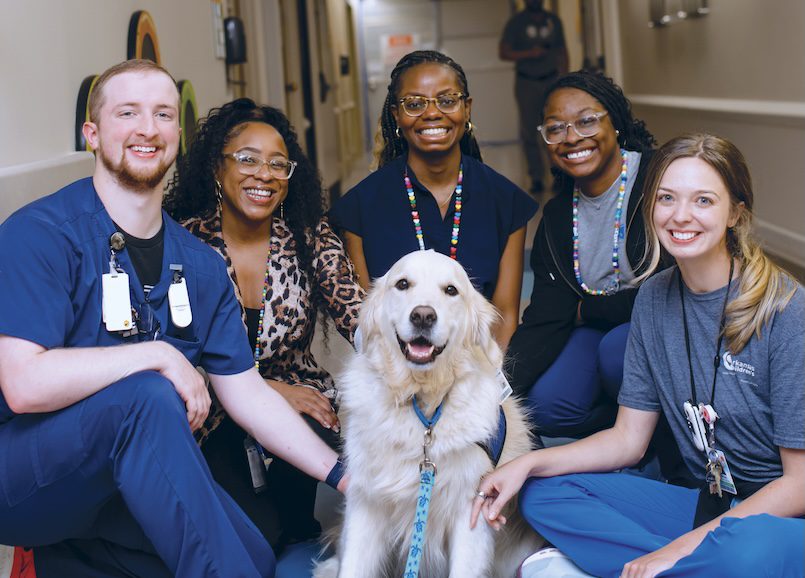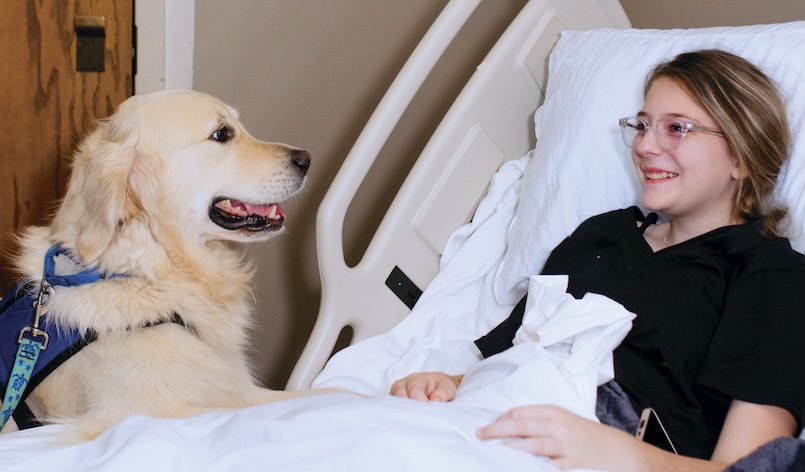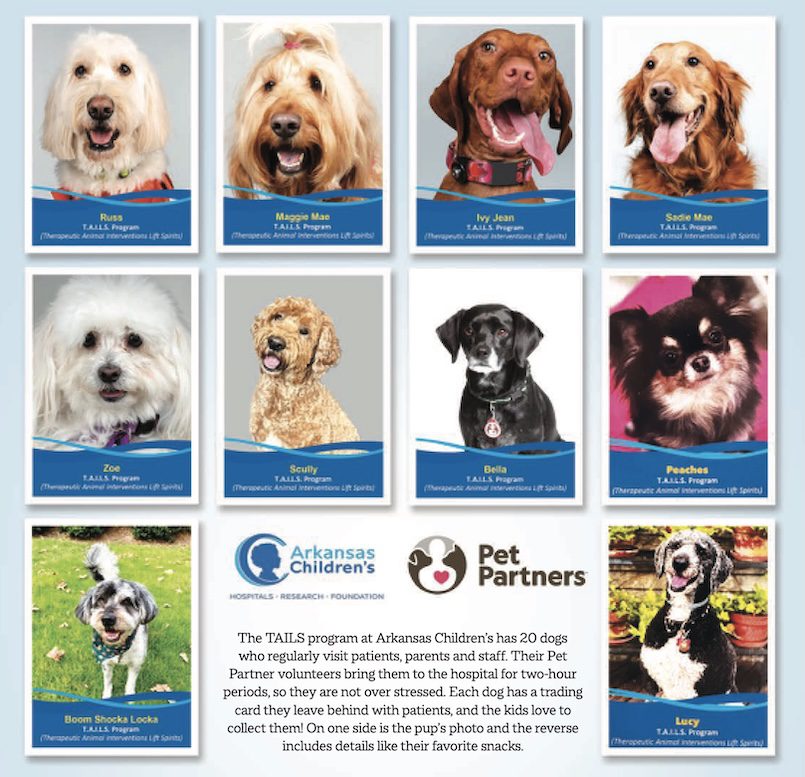29 Sep 2024 Pet of the Month: TAILS
By Stefanie W. Brazile
The physicians at Arkansas Children’s Hospital (ACH) frequently write prescriptions for a dose of unconditional love from four-footed, furry friends. The TAILS program has lifted the spirits of children, parents and staff for 23 years.

“A lot of our patients miss their animals from home, and visits from the dogs provide comfort and reduce anxiety in the hospital setting,” said Raquel Cooper, Certified Child Life Specialist and TAILS Coordinator. TAILS stands for Therapeutic Animal Interventions Lift Spirits.
“Patients may be dealing with a new diagnosis or an upcoming surgery, and it’s comforting and therapeutic to interact with a dog,” Cooper said. “It also improves mental health, which improves coping and overall well-being while in the hospital.”
The TAILS program boasts 20 dogs and handlers who make weekly visits to the playroom, clinics, family houses and bedsides within ACH. Each pet is required to go through a certification process with the Central Arkansas Pet Partners Chapter and is recertified every two years. There are other requirements, such as receiving a bath within 24 hours of the visit. The dogs must be good at giving and receiving affection with a calm disposition. These pets make the best doses of animal-assisted intervention (AAI) that a doctor could order. According to the Pet Partners website, AAI improves both physical and mental health because of the healing effect of the human-animal bond.
TAILS volunteer Marian Berry said that the visits also benefit her English cream Golden Retriever, affectionately referred to as Stan the Man. “He doesn’t really like car rides, but as soon as we get to the hospital, he almost pulls me across the parking lot,” she said.

“I feel fortunate to have a dog that I can share, and he truly brightens the day of these patients,” she said. “The TAILS acronym is perfect because Stan is lifting spirits! It brings me tremendous joy to get to be with these kids while they are visiting with him.”
Berry was inspired to volunteer back in 2008 after seeing an ACH calendar with TAILS participants on it. “I knew immediately that I had a Labrador that would be perfect for that. Callie and I volunteered from 2008 to about 2015. In 2017, I got Stan. The dogs must be a year old to be tested by Pet Partners. I tested him right after he turned 1, and he tested at the highest level, and we went to work immediately.”
Stan is described as a loving, calm, sweet dog that likes to be around many people. He even falls asleep sometimes on the bed with a patient because he enjoys snuggling with the kids. “The kids don’t seem to care at all,” Berry said. “They think it’s charming that he falls asleep. I tell him he has to wake up because we’re working!”
The dogs are on rotation at the hospital, and each time they visit, they leave behind a trading card with their image on the front and facts about them on the back, like when they started and what their favorite treats are. The children love to collect the cards, and some handlers also have color sheets they will leave behind.

One of the hospital’s Child Life Specialists coordinates and supervises the TAILS visits. They also help prepare patients emotionally for procedures and surgery, so they are aware of children who need extra support. “You might have a kid who is down and not engaging a lot,” Cooper said. “A TAILS visit can reduce fears and anxiety, and you see them engaging more. Petting the animal and watching them do a trick helps them to feel comfort. That’s why I really love doing the program!”
Cooper said it means a lot to parents to see their child relax and smile. “I’ve actually heard a parent say that was the first time they had seen their kid smile,” she said. “It meant a lot to them to get a glimpse of the kid they know at home. Having a good experience in the hospital helps reduce the parent’s anxiety too.”
Cooper and other Child Life Specialists also schedule TAILS visits for the staff. This trend started during COVID-19 and has continued. “If there’s low morale because of a tough case, we could bring the dog in specifically for staff well-being and to build morale.”
The 20 furry heroes in the TAILS program don’t wear capes, but they do wear vests and badges. Their devoted handlers watch to be sure their dog is not overstressed, and Pet Partners has a two-hour cap on how long a dog can provide AAI on a given day.

“I believe dogs are very intuitive and extremely sensitive to far more than human emotions than we realize,” Berry said. “Because of this, they can become stressed even as they provide comfort and stress relief to patients. I questioned it at first, but I realized it’s good to have that limited amount of time and then go home and rest.”
The seriousness of cases handled by the state’s only healthcare system solely dedicated to caring for children also affects TAILS handlers.
“I don’t even realize it until I head to my car, and I realize I am tense and exhausted in a really good way,” Berry said. “When you’re there, you are on, and I want to make sure it’s the most positive experience for those kids and that they are comfortable and happy with the visit, so I put a lot of energy into it.”
And this is just what the doctors order.








